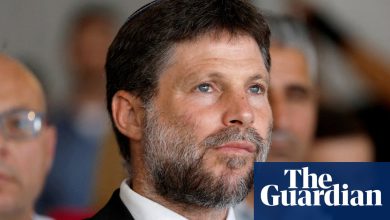‘Musical soulmates’: the extraordinary story of The Piano sensation Lucy and her doting teacher | Music TV

[ad_1]
Lucy Illingworth is the breakout star of the ringing TV talent show The piano. When the teenager, who is blind and neurodivergent, sat down at Leeds train station, then aged 13, her rendition of Chopin’s Nocturne in B flat brought rush-hour crowds to a halt and brought passers-by to tears. Videos of the performance garnered millions of views online and was nominated for The 2024 Bafta Moment.
in season one finale at the Royal Festival Hall in London, Lucy was crowned the unofficial winner of the Channel 4 show. She was duly invited to perform in concert for the coronation of the king last may But as a new documentary reveals, the biggest concert of Lucy’s life was almost ruined when her lifelong piano teacher ran afoul of royal guards.
The incredibly talented Lucy – as host Hugh Bonneville introduced her at the event at Windsor Castle – tells her extraordinary story. Airing after the final episode of The Piano this Sunday, the deeply moving film follows Lucy’s decade-long friendship with her teacher Daniel Bath, who describes them as ‘musical soul mates’.
In the film, when the royal holiday arrives, Bath admits that he is “opposed to the idea of monarchy” and would normally decline such an invitation, but his devotion to his student outweighs such misgivings. Today, he says: “It’s not something I would normally do, but I owe it to Lucy. My views don’t matter. It’s all because of Lucy. Where she goes, I go.
Except at the King’s concert, a wedge was driven between the pair. In a scene caught on camera, Bath is denied entry because he “does not meet minimum security requirements.” His reaction is puzzled (“What? Why? Really?”) before guessing that it’s probably due to his ties to Vanishing Rebellion. A security guard was sent to take his backstage pass because he was “high risk.” He laughs in disbelief, “They think I’m a threat.”
“It’s a good twist, isn’t it?” he says. “We had applied for a security clearance a few weeks before, but just as we were about to leave the hotel for the dress rehearsal, the BBC rang me and said, ‘I’m afraid the Royal Family say you’re not allowed in.’ To this day I have not been given a reason why. I guess this is because of my involvement in climate change activism. That’s the only thing that could have been noted, but they didn’t confirm it. Has he ever been arrested for protesting? “No, I was just at demonstrations. I always have.
“I found it all ironic for two reasons. First, the theme of the entire concert was the need for climate action. Second, my activism is for exactly the same reason I teach Lucy. As far as I’m concerned, nothing is more important than children and the future of our planet. That’s my whole motivation. It is strange that I should be punished for this.
Bat usually accompanies Lucy on stage. He guides her to the piano, helps her find the pedals, and stays close at hand in case of hesitation. “Luckily she had her wonderful assistant, Lisa. I work a lot, but I have it easy compared to Lisa. I make Lucy do what she loves, which is playing the piano. All the other day-to-day school stuff is hard, so it’s wonderful that Lisa got this moment instead.’
He was very apologetic, fearing that he had disappointed Lucy. “Even when I’m gone, she’ll call, ‘Daniel, Danielle!'” We have a very close, symbiotic relationship and she understands how I feel. That’s why it was great to have Lisa and her mom, Candace, with her. I was confident he would be fine. She’s not the one who gets nervous; I am. Also, she wasn’t playing a very complicated piece. If she was doing a Rachmaninov concerto, I’d be a little more concerned.”
Luckily, Lucy was able to deliver a perfect rendition of Bach’s Prelude in C Major in front of 18 million viewers, prompting Queen Camilla to have what The Piano judge Micah called “a total fan moment”. Bath could only watch from his hotel room on the other side of town.
“It was weird watching it on TV. I had to experience Take That for a start. Obviously I would have loved to be there for her, but at least I got to see Lucy from the audience’s point of view for once. I’m always sitting next to her, trembling with fear that something will go wrong and whispering strange things when I feel she might go off track. Lisa did all this while I got to enjoy people’s responses. It was a nice reminder of, “Oh yeah, she’s really good!” And I loved the ending. Lucy always goes around the end because she loves that communication and reaction.”
Bat is too nice to admit he’s angry about what happened. “It was just annoying. I had spent two days in Windsor and they wouldn’t even let me in!” What annoys him more is the inequality in education. “Currently 90% of children in the UK do not have access to instrumental learning. This annoys me a lot. The whole point of comprehensive schools is that every child has an equal opportunity, but when it comes to music, families can pay to get better provision. It is unfair and un-British.”
In the documentary, Bath says the experience “didn’t exactly warm me to the monarchy”. He laughs as he remembers his phrase. “Well, I was raised to be polite. Being antagonistic doesn’t help anyone. You have to take people with you. This is my approach to education. We’re all in this together. Society is everyone.”
Bath met Lucy when she was three. Since then, he has worked closely with her. Lucy was born with cancerous tumors in her eyes, while a duplication of chromosome 16 meant she was developmentally delayed; she has autistic traits and is largely non-verbal.
Kindergarten teachers at her special school in Halifax noticed how musical she was. Even as a toddler, Lucy could flawlessly play nursery rhymes on a toy keyboard and hit the glockenspiel with flawless rhythm. They connected Amber Trust, a charity that provides musical opportunities for blind and partially sighted children, where Lucy was discovered to have perfect pitch. The charity advised finding a piano teacher.
after the promotion of the newsletter
Enter Bath. “I’ve worked a lot with children with additional needs, teaching in non-traditional ways,” he says. “I knew right away that Lucy had an amazing understanding of music, but no technique. Her hands were tiny. I’ve spent the last decade teaching her proper finger movements and introducing her to the repertoire.”
He devised a method where he played the piano while Lucy placed her hands on top of his, following his hands over the keys, feeling which fingers were doing what. “When she was a baby, Candace used to play Classic FM to help her relax. Lucy just swallowed it all. Wagner, Beethoven, Bach – she remembers everything she hears, even just once, and then tries to play it.
“Sometimes, it’s a white-knuckle ride: ‘Oh, you already know that Mozart piece?’ Okay, let’s go. This is by no means a normal piano teaching experience, but it is very exciting. She is the most talented musician I have ever met.”
Bath says Lucy’s virtuoso abilities “make you rethink how the brain works – and how the heart works”. He is palpably proud that the world is in awe of her gifts. To him, however, his star pupil represents something broader.
“As well as spending a lot of time with Lucy, I run a charity called Music for many, who was inspired by her. We work to break down the barriers that stop children from accessing music education and raise funds for free instrument lessons.
“Lucy’s performance going viral shows that if you give a child a chance, that’s what you can get – something so magical that it touches people all over the world.” She is a great example of why all children should be given the same opportunities. There are thousands of Lucys in our communities. Music can help them thrive. We hope the documentary will spread this message.
how is lucy “I actually just finished a lesson with her,” says Batt. “Lucy is in brilliant form. She’s a fast learner, so her music has changed a lot since the documentary was shot. We were in the recording studio putting together, so to speak, an album of Lucy’s greatest hits. This is an early stage. You have to take it step by step, walk with her on her path.”
Bath admits that meeting this talented toddler changed his life. “Lucy is the best thing that ever happened to me. She inspires so much of my work. When everyone hears her play, it makes them question their assumptions about what is possible.
“People with disabilities and learning disabilities are still underrepresented and underserved. This made me even more determined to fight for musical opportunities for all children. If the education system says we can’t afford it, that’s bullshit. For many children, music is vital. Lucy is the living embodiment of this.
The incredibly talented Lucy airs at 10.05pm on May 5 on Channel 4
[ad_2]




